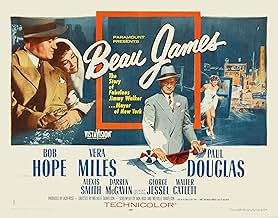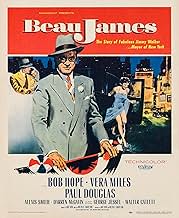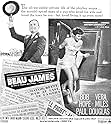Biopic of the political career of Jimmy Walker, flamboyant and somewhat corrupt Mayor of New York City from 1926-1932.Biopic of the political career of Jimmy Walker, flamboyant and somewhat corrupt Mayor of New York City from 1926-1932.Biopic of the political career of Jimmy Walker, flamboyant and somewhat corrupt Mayor of New York City from 1926-1932.
- Director
- Writers
- Stars
Eric Alden
- Reporter
- (uncredited)
Babette Bain
- Puerto Rican Child
- (uncredited)
Russ Bender
- Reporter
- (uncredited)
Jack Benny
- Jack Benny
- (uncredited)
John Benson
- Photographer
- (uncredited)
- Director
- Writers
- All cast & crew
- Production, box office & more at IMDbPro
Featured reviews
I believe it was Walter Winchell who coined that nickname for James J. Walker, Mayor of New York from 1926 to 1932 and the subject of this biographical film starring Bob Hope. It was Hope's last stab at a serious dramatic part. While he does well in it, Hope never tried as serious a role again in his career.
Jimmy Walker was the Majority leader of the State Senate and was the personal choice of Governor Alfred E. Smith to be Mayor of New York. Then as now, Republican mayors of New York City were a rarity, the Democratic nomination was sufficient guarantee to be elected.
Al Smith had dreams of being the Democratic presidential candidate. He almost was in 1924, but could not get past William Gibbs McAdoo that year in the famous 103 ballot convention that eventually turned to compromise dark horse candidate John W. Davis who went down in November to Calvin Coolidge. Smith wanted to secure his home base, but the mayoralty of New York and the patronage of the office was controlled by Smith's arch enemy, publisher William Randolph Hearst and his stooge Mayor John F. Hylan. Smith ran Walker in the 1925 primary and beat Hylan and then Walker handily won the General Election.
Smith knew Walker was a lightweight and he took the unusual step of having a gubernatorial office put in City Hall where he would be at least once a week, keeping tabs on Jimmy. Smith became the Democratic presidential candidate in 1928 and lost to Herbert Hoover. No longer governor, Smith was not around to keep Walker on a short leash. That's when he got into trouble.
Walker was a colorful figure during Prohibition. He and Smith were both unalterably opposed to the idea and Smith even served notice that the law enforcement arm of New York State would not be wasting its time on policing the drinking habits of New Yorkers. Walker got the nickname the Night Mayor of New York because as often as not he'd sleep all day and be partying all night at the famous Central Park Casino.
It was there that Walker met showgirl and began a long term affair with her. His marriage to his wife Allie was long over, but for appearance's sake, for the millions of Catholic voters in New York he kept the facade up.
Times have certainly changed. We now have a former Mayor of New York, named Rudolph Giuliani running for president with three marriages to his credit and a nasty divorce that got spread out in the tabloids.
Nobody ever mentioned Walker and president in the same breath. It was trouble enough to keep him paying attention to his job as mayor. The cronies he had from Tammany Hall ran wild, especially when Smith was no longer governor to keep them and him in line. During the boom times of the Twenties, people laughed at his colorful antics, but come the Depression and the stories of graft became routine newspaper stories, public opinion turned against Walker overnight.
Bob Hope made a fine Jimmy Walker and the two women in his life, Vera Miles as Betty and Alexis Smith as Allie give him good support. In one of his last films, Walter Catlett makes a brief appearance as Alfred E. Smith, and the rest of the cast is headed by Paul Douglas as a Tammany boss and Darren McGavin as Charles Hand, Walker's press secretary and conscience.
Beau James is a colorful account of a colorful era. It certainly as a film version of his life one that Jimmy Walker would have approved of.
Jimmy Walker was the Majority leader of the State Senate and was the personal choice of Governor Alfred E. Smith to be Mayor of New York. Then as now, Republican mayors of New York City were a rarity, the Democratic nomination was sufficient guarantee to be elected.
Al Smith had dreams of being the Democratic presidential candidate. He almost was in 1924, but could not get past William Gibbs McAdoo that year in the famous 103 ballot convention that eventually turned to compromise dark horse candidate John W. Davis who went down in November to Calvin Coolidge. Smith wanted to secure his home base, but the mayoralty of New York and the patronage of the office was controlled by Smith's arch enemy, publisher William Randolph Hearst and his stooge Mayor John F. Hylan. Smith ran Walker in the 1925 primary and beat Hylan and then Walker handily won the General Election.
Smith knew Walker was a lightweight and he took the unusual step of having a gubernatorial office put in City Hall where he would be at least once a week, keeping tabs on Jimmy. Smith became the Democratic presidential candidate in 1928 and lost to Herbert Hoover. No longer governor, Smith was not around to keep Walker on a short leash. That's when he got into trouble.
Walker was a colorful figure during Prohibition. He and Smith were both unalterably opposed to the idea and Smith even served notice that the law enforcement arm of New York State would not be wasting its time on policing the drinking habits of New Yorkers. Walker got the nickname the Night Mayor of New York because as often as not he'd sleep all day and be partying all night at the famous Central Park Casino.
It was there that Walker met showgirl and began a long term affair with her. His marriage to his wife Allie was long over, but for appearance's sake, for the millions of Catholic voters in New York he kept the facade up.
Times have certainly changed. We now have a former Mayor of New York, named Rudolph Giuliani running for president with three marriages to his credit and a nasty divorce that got spread out in the tabloids.
Nobody ever mentioned Walker and president in the same breath. It was trouble enough to keep him paying attention to his job as mayor. The cronies he had from Tammany Hall ran wild, especially when Smith was no longer governor to keep them and him in line. During the boom times of the Twenties, people laughed at his colorful antics, but come the Depression and the stories of graft became routine newspaper stories, public opinion turned against Walker overnight.
Bob Hope made a fine Jimmy Walker and the two women in his life, Vera Miles as Betty and Alexis Smith as Allie give him good support. In one of his last films, Walter Catlett makes a brief appearance as Alfred E. Smith, and the rest of the cast is headed by Paul Douglas as a Tammany boss and Darren McGavin as Charles Hand, Walker's press secretary and conscience.
Beau James is a colorful account of a colorful era. It certainly as a film version of his life one that Jimmy Walker would have approved of.
After seeing "Beau James" I was left wondering..."why would they want to make a movie out of THIS??". After all, Mayor Jimmy Walker was far from being honest or virtuous. And yet, oddly, the film is trying to say that he was KINDA these things.
The film is a Hollywoodization of the career of Jimmy Walker (Bob Hope) once he became mayor of New York City. Mostly, it shows him worried about his wardrobe, taking bribes and being a man adored by New Yorkers. But, the object lesson appears to be "He wasn't nearly as dishonest as he could have been!". Huh?
For me, by the time the movie ended I was left with a strange sense of confusion. Why was Walker worthy of a biopic? And, why should I care about his love life? And, was Bob Hope playing Walker...or Bob Hope?
The film is a Hollywoodization of the career of Jimmy Walker (Bob Hope) once he became mayor of New York City. Mostly, it shows him worried about his wardrobe, taking bribes and being a man adored by New Yorkers. But, the object lesson appears to be "He wasn't nearly as dishonest as he could have been!". Huh?
For me, by the time the movie ended I was left with a strange sense of confusion. Why was Walker worthy of a biopic? And, why should I care about his love life? And, was Bob Hope playing Walker...or Bob Hope?
This is the closest thing to a good dramatic performance Bob Hope ever gave...and its pretty good. Of course, the film soft pedals and simplifies: Walkers great antagonists, Seabury and LaGuardia, barely appear in it. In fact, there is a great dramatic and tragic film waiting to be made of the Jimmy Walker story, with terrific roles for the actors who would portray the "little flower' LaGuardia, and the incorruptible, if cold -hearted, "man who rode the Tiger", Seabury, as well as Jimmy Walker ( not to mention his wife and mistress). Maybe Scorsese could do it someday.
The life of Jimmy Walker would make a great film. It could be a tragedy in the Greek tradition - a man of many gifts with a single fatal flaw. A pretty good, though short-lived, musical Jimmy, was on Broadway in 1969 for about 85 performances. It had a good score, excellent casting and quite a story..... it missed it's audience though - theater goers in the late sixties were played out on musicals of the past, and didn't want to hear about politicians not attending to duty.
The film does well to capture the spirit of the 1920s via the 1950s, and stays true to Gene Fowler's memorable biography. Hope is an inspired choice for the tin pan alley songwriter turned politician.
Alexis Smith does a good job. And its always a pleasure to see Jimmy Durante, that well-dressed man.
Though pretty one-dimensional, it is good this film was made if only to chronicle the story of a man who really could have done great things, if he'd only paid attention to business and not got caught up in extra-marital problems and suspect financial transactions made by friends on his behalf.
The film does well to capture the spirit of the 1920s via the 1950s, and stays true to Gene Fowler's memorable biography. Hope is an inspired choice for the tin pan alley songwriter turned politician.
Alexis Smith does a good job. And its always a pleasure to see Jimmy Durante, that well-dressed man.
Though pretty one-dimensional, it is good this film was made if only to chronicle the story of a man who really could have done great things, if he'd only paid attention to business and not got caught up in extra-marital problems and suspect financial transactions made by friends on his behalf.
Over all the many times I've seen this film, it never once occurred to me that it might actually be historically accurate. Nor did it occur to me that it would matter much either way. This is the perfect glossy 1950s Hollywood 'biopic'... a totally charming film, yet with more emotional depth and dramatic substance than most that were cranked out in this politically-delicate period.
For starters, there's a totally charming performance by Bob Hope. This was the perfect part for him: the chance to seriously play a character who was never quite serious. Hope makes the good times effervescent, and the sad times not quite so sad. He makes the central love affair between a man and a city seem completely believable. (Where in real life, obviously things could never be so simple.)
But the real star of this film is the City of New York itself. Not the 'real' city... the fabulous city of myth, as only Hollywood can spin that myth. Resonant with names that are familiar even to people who've never been within thousands of miles of New York, and evocative of a history that even New Yorkers probably recall only vaguely. Just as The Untouchables etched out a stark black-and-white portrait of 1920s Gangland Chicago, Beau James paints a fond, Technicolor memory of 1920s New York.
It's true that Bob Hope's performance, while perfect for the film, was perhaps not Oscar-worthy. (The question would be moot if the Academy had the brains to give out occasional Oscars for the great art of Comedy!) But no matter... Beau James is a well-polished gem of a movie for more reasons than just Hope. Yes, it's corny, and commercial, and formulaic... but in the best way. It romanticizes something that really deserves it.
I wish I was watching it right now...
For starters, there's a totally charming performance by Bob Hope. This was the perfect part for him: the chance to seriously play a character who was never quite serious. Hope makes the good times effervescent, and the sad times not quite so sad. He makes the central love affair between a man and a city seem completely believable. (Where in real life, obviously things could never be so simple.)
But the real star of this film is the City of New York itself. Not the 'real' city... the fabulous city of myth, as only Hollywood can spin that myth. Resonant with names that are familiar even to people who've never been within thousands of miles of New York, and evocative of a history that even New Yorkers probably recall only vaguely. Just as The Untouchables etched out a stark black-and-white portrait of 1920s Gangland Chicago, Beau James paints a fond, Technicolor memory of 1920s New York.
It's true that Bob Hope's performance, while perfect for the film, was perhaps not Oscar-worthy. (The question would be moot if the Academy had the brains to give out occasional Oscars for the great art of Comedy!) But no matter... Beau James is a well-polished gem of a movie for more reasons than just Hope. Yes, it's corny, and commercial, and formulaic... but in the best way. It romanticizes something that really deserves it.
I wish I was watching it right now...
Did you know
- GoofsMayor Walker is in a parade near movie's end. In the background is a 1955 or 1956 Cadillac.
- Quotes
Mayor James J. 'Jimmy' Walker: Goodbye... but remember this: the voters always get what they deserve. I wasn't the only chump in this city. It took a lot of you to elect me.
- ConnectionsFollows La Glorieuse Parade (1942)
- How long is Beau James?Powered by Alexa
Details
Box office
- Gross US & Canada
- $1,750,000
- Runtime
- 1h 45m(105 min)
- Aspect ratio
- 1.85 : 1
Contribute to this page
Suggest an edit or add missing content





































